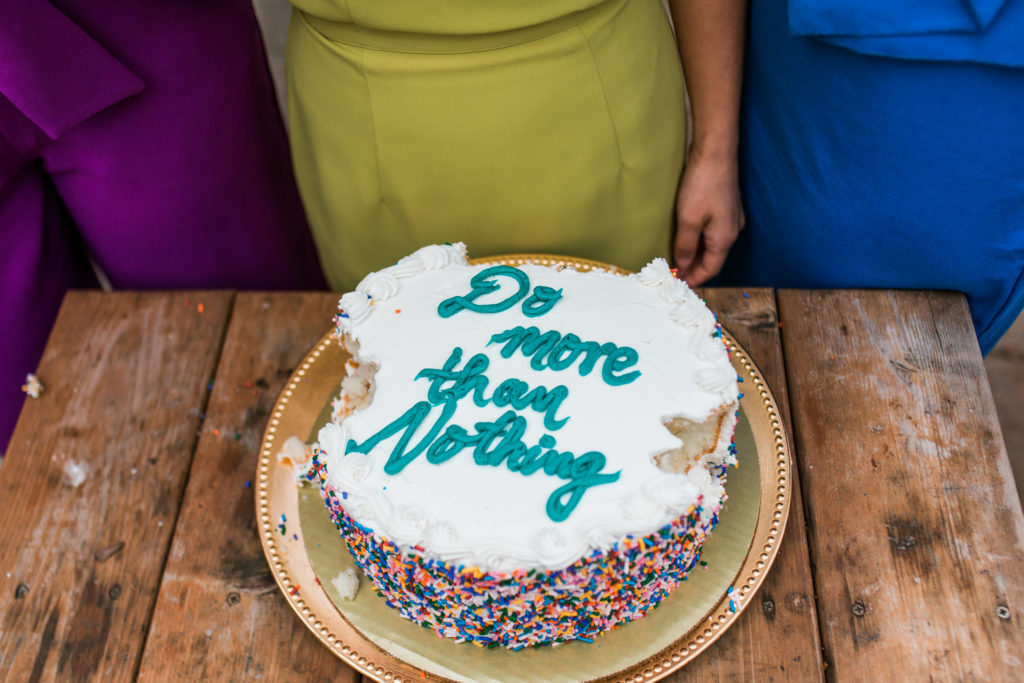Through their community mindset and podcast The Rabble, the women of Rouser are crushing political dread one to-do list at a time.
By Brianna Caleri, Photos by Taylor Prinsen
It’s Friday night at Cheer Up Charlie’s and Kristen Gunn can’t stop thinking about Butterfingers. She and Ashley Cheng, the two thirds of the progressive political organization Rouser who don’t have the flu, are recording a live on-stage episode of their podcast, The Rabble, at Boss Babes’ annual State of the Uterus. The topic of the night is sex education.
They challenge the audience to a multiple-choice quiz on abstinence metaphors used in state-sanctioned sex-ed textbooks. But what they pose is a trick question, since all three answer choices have been taught in Texas schools to encourage students to not have sex until marriage, including a Butterfinger metaphor, as in: “Would you rather be a whole Butterfinger, or a chewed-up Butterfinger?” Gunn spews her mangled Butterfinger from the stage in laughter.
It’s a bad metaphor for sex-ed, but the night perfectly represents the unruly glee of The Rabble. With the addition of Becky Bullard, the three women call themselves an “unruly mob,” and they live up to it. Their goal is to demystify Texas politics and encourage action, demonstrating the transformative power of local government. They achieve it by cursing, punning, laughing and crying in a roundtable format with a guest every week. And they don’t hide their lack of political expertise; if they can do it, they emphasize, anyone can.
Bullard brought Rouser together. She had known Cheng for a while, as their paths kept crossing through mutual friends and a shared stint on the leadership board of Slow Food Austin. They drifted apart but stayed connected on social media, where Cheng would post about activism. After the 2016 election, Bullard decided she wanted to learn to be an activist. She went to Cheng in search of a buddy for her journey.
Gunn, fittingly, is a frequent provider of non sequiturs on The Rabble, who got involved by coincidence. She regularly attended community meetings and was excited to spot a woman who wasn’t decades older than she was. She approached Bullard, recognizing a familiar energy in her “vibrating need to do all the things.”
The Rabble was conceived through a desire for community engagement. With positivity and a willingness to publicly discuss their own mistakes, Rouser built a community for people who care but don’t know how to take consistent action. “I wanted everyone to know that I didn’t know what I was doing,” Cheng says, “and that we should all not know what we’re doing together and figure it out.”
Through polling, they found their target audience typically faces three roadblocks to political engagement. In Gunn’s words, “People are turned off by politics because it’s a bummer, people don’t feel like anything they do will matter or people don’t see any clear way to help.”
The Rabble provides a leg up in every category, with positivity and accessibility, stories of success and stories of further need, and weekly assignments.
“We’re like Lisa Frank goes to the capitol,” Bullard says, smiling.
POLITICS ARE NOT A BUMMER
Most traditional etiquette tells us to avoid politics at all costs when speaking to family, coworkers or friends we don’t want to lose. Politics are for arguing, and proving things, and if you’re not mad, you’re not paying attention. It is sometimes a misguided badge of honor, Gunn points out, to insist we are above politics.
“‘I don’t like politics’ is synonymous with saying, ‘I’m not petty,’” she says.
But to have a political opinion requires knowledge of a complicated system that few fully understand and sharing it risks getting called out or “cancelled” when people don’t agree. In short, being involved in politics means being involved in being wrong. And The Rabble is here to teach you how to be wrong in the right way.
The first step is recognizing the difference between intent and impact. In season two, on the episode “Building a More Intersectional Texas with Measure,” listeners meet two women who work for the Austin-based organization Measure and embody a healthy partnership between a community and its allies. Founder Meme Styles educates on black stereotypes and statistics while Janis Bookout, the white director of performance and evaluation, joins the conversation to shepherd white listeners through confronting benevolent prejudice within themselves. This symbiosis echoes the relationship between The Rabble and its featured guests: One creates a learning space that is empowered by humility, while the other provides the hard facts and lived experience.
In that same episode, Bullard shares a personal story acknowledging the racial bias she will already have to help her 5-year-old undo. Bullard relishes the power of personal stories, saying she hopes hearing about a mistake “gives our listeners permission to forgive themselves for when they screw up, too.”
Letting go of defensiveness, then, allows for a release of uptightness. The unapologetic positivity within each hour ranges from cathartic outbursts (gleefully shouting, “Ew!” at the mention of Texas Rep. Chip Roy) to disarmingly sincere interjections of gratitude for each other. Even exercising their rights to frequent bouts of crying feels like rebellious, reimagined positivity—it’s their podcast and they’ll cry if they want to.
Lightening the mood around topics as heavy as abortion, family separation and gun laws is hard, but necessary work to undercut intimidation and keep the activism flowing. Cheng, especially, leans on dry humor and a heavy coating of irony to discuss bad situations without losing momentum. She sees the privilege that kind of positivity takes, and all three use it to convert disheartening realities into rowdy brunch talk.
THE THINGS WE DO MATTER
Positivity is a powerful motivator, inspiring people to face intimidation, past failures and negative perceptions. Social-justice activist Adrienne Maree Brown coined the term “pleasure activism” to describe the philosophy that politics can and should be fun. In order to create sustainable movements, people have to avoid burnout and feel inspired. After drawing in political skeptics with its contagious positivity, The Rabble’s next mission is to show listeners that their participation matters.
Much like the women who dubbed themselves “nasty women” in 2016 after a derogatory comment by President Donald Trump, The Rabble founders identify as an “unruly mob” as an homage to Wendy Davis’ infamous 2013 filibuster. The Texas Legislature was poised to pass an anti-abortion bill when Davis took the floor seven years ago. Armed with personal stories from supporters, Davis set her sights on midnight, 13 hours away. Her filibuster continued until the Republican Lt. Gov. David Dewhurst ruled her out of order.
As Davis’ turn to speak ended, other legislators started raising their own voices. In a pivotal moment, Sen. Leticia Van de Putte shouted, “At what point must a female senator raise her hand or her voice to be recognized over the male colleagues in the room?” Rabble rousers on every level of the capitol building rotunda started shouting; the noise crescendoed as protestors in the hallways and outside joined in. The Senate, unable to vote over the chaos, let midnight pass, and the new day swept the bill away with it. Dewhurst told reporters, “I didn’t lose control of what we were doing.” Instead, he complained, “We had an unruly mob.”
Just as Davis relied on the stories of Texas women to delay the bill, The Rabble leans on its guests to be the voices of the state. Gunn, Cheng and Bullard are positivity emcees who collect and distribute stories, proving that things are being done.
All three are adamant about constituents calling in, testifying or otherwise making their voices heard. To those afraid of confrontation, they emphasize that it’s a representative’s job to be nice to the public they serve. Cheng says calling her representatives to complain is “the cheapest form of therapy.”
“I used to feel like I needed to have something really well-researched to say, or something that came directly from an organization that was really reputable that I respected,” Cheng says. “But then I realized that I should have more self-respect for my own opinions, and that’s literally why our representatives are there.”
THERE ARE CLEAR WAYS TO HELP
The final step in The Rabble’s activist initiation is homework. It’s easier than it sounds. In fact, not only do the assignments eliminate the awkward effort of getting the ball rolling in new political spaces, they’re designed to be achieved in a couple of minutes. Both mothers themselves, Gunn and Bullard know the importance of equipping moms with tiny tasks that fit into their schedules. Even without kids, there are obstacles for anyone to get involved, such as not having a car.
Calls to action can be as simple as buying a black doll to send to daycare to increase representation at a young age, or RSVPing to an event. At the live taping for the first season finale, Cheng asked the audience to save the phone number to the office of Texas Sen. John Cornyn. She demonstrated how to call and leave a voicemail and asked that each member of the audience call on the drive home. Many of them did. Specificity is the secret ingredient that has proven to motivate Rabble listeners in taking formerly intimidating steps. The podcast’s Instagram stories detail obscure bureaucratic processes and if listeners are still nervous, the founders offer to help; they’ll march with you, call representatives with you or testify in court with you.
Bullard says the antidote to political dread is “giving people actionable things that they can do and showing them the difference that it will make.” To this effect, Rouser partnered with Blue Squad, an app that allows users to follow organizations and complete their assigned tasks. Even if the task is just to sign up with a new organization, the 30-second commitment opens the doors to more opportunities, sparking a domino effect.
Evolution at The Rabble is caring, learning, listening and joining. Coined by frequent guest Stephanie Chiarello, its rallying cry is simple but convicting: “Do more than nothing.”
HOW TO BECOME AN ACTIVIST IN A YEAR
Right now: “Check that you’re registered to vote on Register2Vote.org,” Bullard says. “If you lean Democrat, download the Blue Squad app to look up who represents you (and who is running against them).” Check out Rock the Vote, Vote 411 and The Texas Tribune for nonpartisan voting resources.
Today: “Pick your democracy buddy. It’s easier (and more fun) to do democracy with a friend,” Bullard says. The Rouser girls recommend meeting fellow advocates at events hosted by Annie’s List, Indivisible, The Texas Tribune, Blue Action Democrats and the League of Women Voters.
This week: “Look up your precinct chair and connect with them,” Bullard recommends. “This is the person in charge of making sure your neighborhood turns out to vote. They will be thrilled to have your help and can answer questions and point you to more resources.”
This month: “Start researching candidates and go see them speak in person if you can. When you find someone you like, volunteer with their campaign: help register voters, write postcards, send texts, make calls, knock on doors. Don’t worry, they will teach you everything you need to know.”
In eight months: “The 2020 general election is Tuesday, Nov. 3, but early voting is from Oct. 19 to Oct. 30,” Bullard says. “Vote in every single race all the way down the ballot. We love to make a party of it by hitting happy hour after casting our ballots.”
By the end of the year: “The Texas Legislature will be back in session beginning in January of 2021,” Bullard says. “This is the body that makes all our state laws, from funding for our schools to restrictions on abortion and everything in between. Stick with The Rabble for tutorials on testifying at the capitol, visiting your lawmakers and [making]the biggest impact right here in our backyard.”
THE LADIES OF THE RABBLE ON THEIR FAVORITE LESLIE KNOPE QUOTES
Kristen Gunn: “Ann, you poetic, noble land mermaid.”
Becky Bullard: “If I had to have a stripper’s name, it would be Equality.”
Ashley Cheng: “I’m big enough to admit that I am often inspired by myself.”




